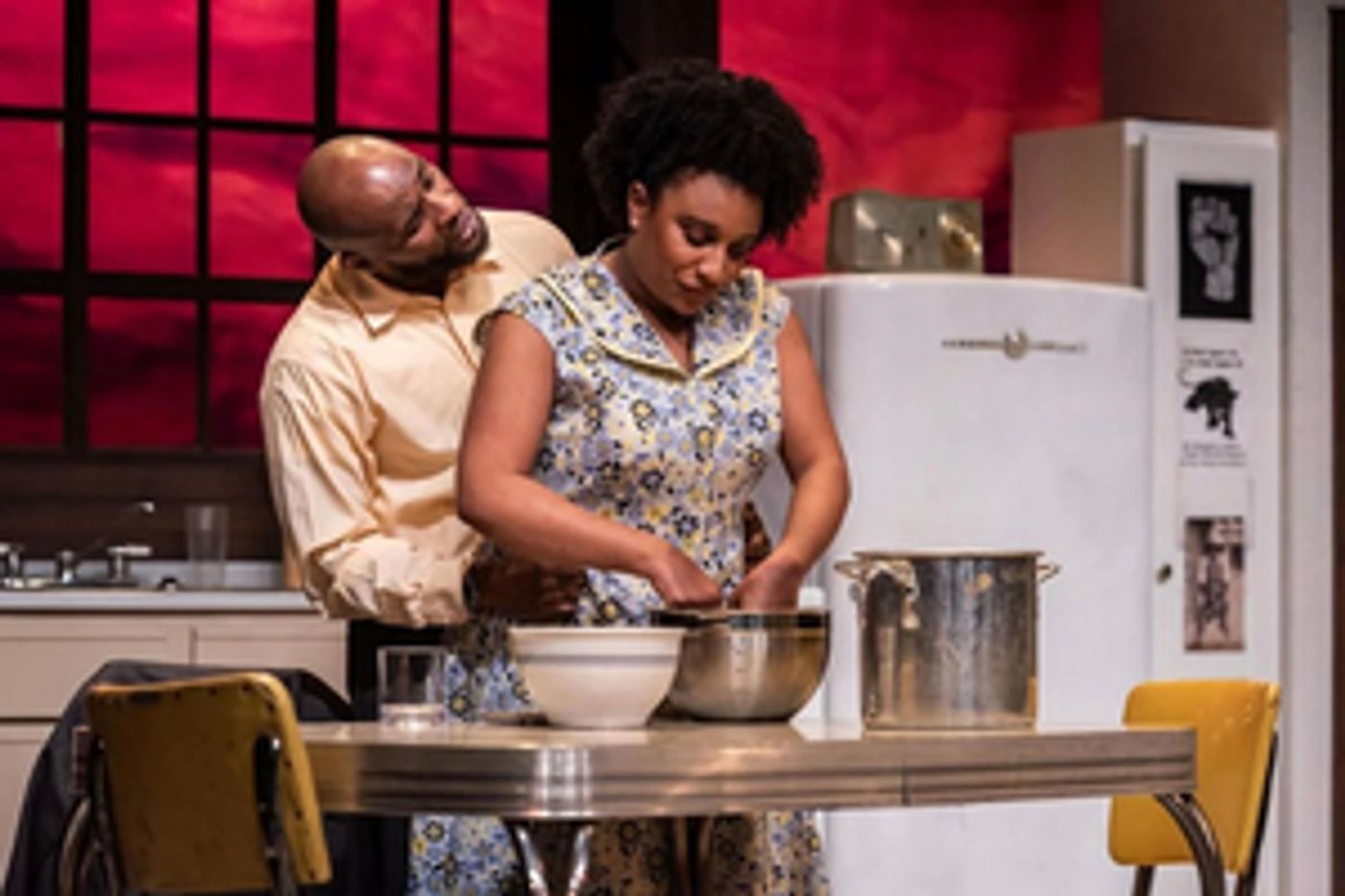Review: FIREFLIES at The Black Rep
A perfect storm of anguish in the Jim Crow South

It's 1963. We find ourselves in a Black home "somewhere down South, where the sky is on fire". We're in Alabama. Charles Grace is a young pastor and a charismatic leader in the area's Civil Rights movement. His wife, Olivia, is his staunch supporter and coach. She's some four months pregnant with their first child.
Such is the setting for the new production at St. Louis' wonderful Black Rep. The play is Fireflies, by Donja R. Love. A young couple, both dedicated to a noble cause--and with the birth of a new child on the horizon--should suggest a story of a difficult but happy struggle leading to a glowing future. But this is the Jim Crow South. Death just seems to follow Black folks around.
Scenic designer Dunsi Dai's work is always impressive. Here he gives us a most convincing modest home: a kitchen with a few Black Power posters, a foyer, a living-room with a sofa, and a tiny back porch with an old rocker--all comfortably blended into the confines of the small Hotchner Studio Theatre. Behind and above the house, on a cyclorama, we see that broad sky, which is at turns rosy or fiery or (in the end) quite "painted with blood". (Thank you, lighting designer Sean Savoie!)
Olivia is alone at the beginning. It's the day after the bombing of the 16th Street Baptist Church in Birmingham where four little girls were killed. Charles has been called out of town to make organizing and memorial speeches. Olivia is in deep anguish. She suffers crippling attacks of aural hallucination in which her head is filled with explosions. She's terrified for her husband's safety. And her baby? Is it fair to bring a Black child into a world like this?
Zahria Moore gives an impressive tour-de-force performance as Olivia. What a tsunami of trauma pours down on this poor woman! There is constant fear, and she has a growing suspicion that Charles, on his speaking trips, has been unfaithful to her.
The very gifted Eric Connors plays Charles. He gives a rich performance, making Charles a loving (and lusting) husband and a committed--if flawed--activist leader.
These two have little secrets from each other. Charles hides his drinking; Olivia hides her smoking. "Smoking is unladylike," he says. What is ladylike? Well, he claims that wanting sex with your husband is the "Number One ladylike thing!"
Olivia is a born writer. She, in fact, is secretly the author of all of Charles' wonderful speeches; he, merely the master of dramatic delivery. Olivia keeps a private journal of her woes, with entries addressed to God. She decides that with all these troubles and doubts she does not want this baby. SHE DOES NOT WANT IT!! She fiercely screams at God to "TAKE THIS BABY BACK!" Charles is totally committed to having the child.
There are secrets to be delved: what is in that mysterious package that came today? It's a tape recorder--but what is recorded on the tape? A secret cache of letters is discovered--intimate letters from Olivia to a mysterious Ruby. Who is this Ruby? Is there a hidden Lesbian love?
Their arguments rise to violence: at one point Charles frighteningly raises his hand to strike her; at another Olivia flashes a butcher-knife in his face.
Fireflies is a strong, powerful play, but it is flawed by excess. It's mountainous levels of emotion leave it not tragedy but melodrama. They not only invite, but demand, histrionics of the grandest old kind. Late in the play we are drawn deep inside Olivia's head, where we experience a rain of bombs whose explosions rock the foundations of our sanity (and, indeed, of the very theater itself). Kudos to sound designer Christian Kitchen for this overpowering effect--as well as for the "right-on" period music that interlaces this drama. In the end Olivia finally gets to preach a glorious sermon--in her own voice. And we gasp to see the night filled with fireflies--each the soul of a dead Black child, wending its way to heaven.
Aristotle (and the French classicists) prescribed three dramatic unities: those of place, of time, and of action (though we've often discarded these). Still, Fireflies meets the first quite easily: we're in the Graces' home. As to unity of time? Well, not bad: four consecutive days. But unity of action? Missed by a mile! The play hasn't quite decided what it's about. Civil rights? Murder? Feminism? Infidelity? Male suppression of a wife's potential? Abortion? Parental rights? LGBTQ acceptance?
Donja Love, describes himself as an "Afro-Queer HIV positive playwright". He says he writes "plays about Black Queer Folx for audiences made of Black Queer Folx". DON'T BELIEVE HIM! This play is for everyone--and it's about every-day, ordinary folks. He says he wants to "normalize these marginalized identities". Well, in Fireflies he takes a small, beautiful step in that direction. Olivia's love for Ruby is so very much not a statement of "sexual identity". Olivia already has a strong identity: she is Olivia Grace! She needs no other. The perfect storm of injustices that surround her could never be corralled into a single label, like "Lesbian" or "Feminist" or even "Wife".
Despite all its excesses, Fireflies, in this production, stints in one small thing: Eric Connors occasionally sings a phrase or two of "You Send Me". I would have loved to hear much more of this wonderfully sweet voice.
Fireflies, directed by Andrea Frye, continues at The Black Rep through February 27th.
(Photo by Phil Hamer)
Reader Reviews

Videos

